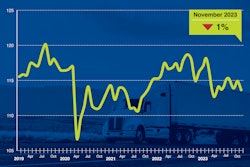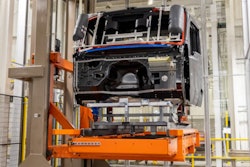The Yellow bankruptcy is widely known, but it isn’t the only carrier that has closed its doors recently, and it won’t be the last.
Industry bankruptcy experts say financial distress at the hands of multiple factors has caused an uptick in bankruptcy cases among trucking and logistics companies of all sizes. Stephanie Lieb, a bankruptcy attorney at Trenam Law in Tampa, and Tim Swanson, a bankruptcy attorney at Moye White in Denver, said they expect that trend to continue … for quite some time.
“I think we're going to see the trend continue for another 12 to 18 months,” Swanson said.
He said what’s driving the demise of these companies is the longer-than-expected recovery from the pandemic because when the world reopened, consumer spending shifted from lockdown-driven goods purchases that caused a freight boom to more services-related spending. In addition to increased wages caused by employee shortages, rising fuel costs and inflation putting pressure on their carriers’ margins, the Federal Reserve kicked off historic tightening by increasing interest rates, putting even more pressure on supply chains. And Swanson said that pressure is resulting in liquidity issues, which has caused debt service to go up, leading many to file for bankruptcy and restructure their debts.
“When you have all these problems, and then they all happen at the same time, and you're already in a business that has a thinner margin, it just becomes a recipe for bankruptcy,” Lieb said.
She said she has especially seen an increase in bankruptcies among smaller trucking operations and thinks that’s because of Subchapter V that was the result of the Small Business Reorganization Act enacted in the fall of 2019. As a result of the pandemic and the CARES Act, Congress bumped up the debt limit to $7.5 million or less, making the process of filing under Chapter 11 more streamlined and affordable for smaller companies.
“Trucking cases don't typically have a high success rate within bankruptcy; they usually wind up in a liquidation versus a restructuring, and perhaps filing for this small business Subchapter V, they’ll have a better chance of success,” Lieb said. “It's hard to say because it’s so new.”
An alternative route
Swanson said carriers who don't have cash or resources readily available are going to find themselves in a difficult spot to be able to operate profitably, and those that are struggling now or are on the verge of struggling will just struggle further, leading to more bankruptcy.
He said those in the industry experiencing financial distress should hire a good bankruptcy lawyer and a good accountant and ensure a long-term business plan is in place.
Spencer Tenney, president and CEO of Tenney Group, a merger acquisition advisory firm dedicated to the transportation industry, took that a step farther. He said carriers should consider consulting with an M&A advisor.
[RELATED: Experts expect M&A in the transportation and logistics industry to thrive in 2023]
“We do have folks that are exploring any and all options, and that's what we're encouraging them to do,” Tenney said. “We're seeing business owners demonstrate great stewardship before they get themselves in a situation where their back is against the wall, and the only option is bankruptcy.
“If there's any hint of that being a possibility, they're starting conversations with bankruptcy attorneys to understand how does this work, what is my timeline, and how do I activate,” he added. “They're also talking to folks like us because any given day in this environment you might be a seller or you could be a buyer.”
Tenney said his company is seeing record engagement as far as buyers who've never strategically bought a trucking company before. That includes 50-year-old established companies that have never grown via acquisition. He said they are recognizing the realities in the marketplace and searching for different approaches to offset economic pressures.
Tenney said he unfortunately expects the down economy to bleed into 2025 without a material correction; the market is not correcting as fast as the industry would hope, he added.
And though the industry has obviously been through down cycles before, this is a unique one because the pressure on margins is coming from beyond one source. But, he said there is an upside.
“What's true is that many people that want to be in this industry for the long term have to materially evolve in terms of how they've done business in the past versus what they're going to need to do in the future to be sustainable,” Tenney said. “The risk in the marketplace is going to give license to a lot of leaders in our industry to go activate some strategic growth plans that they may have sat on for a while had market conditions stayed the way they were. In doing that, I think we're going to see many trucking and logistics companies increase their capabilities and become much stronger.”












